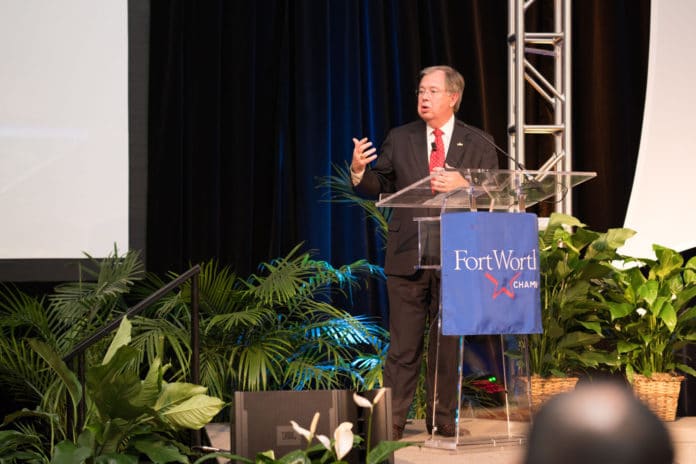A general diffusion of knowledge being essential to the preservation of the liberties and rights of the people, it shall be the duty of the Legislature of the State to establish and make suitable provision for the support and maintenance of an efficient system of public free schools.
– Article 7, Section 1, Texas Constitution
County Judge Glen Whitley is normally a kind of low profile figure, seeing it as part of his duty to connect people to other people to find answers to difficult and pressing issues.
The Fort Worth Business Press recently named him a 2018 Health Care Hero for just that. He and Fort Worth School Board President Tobi Jackson for their role in facilitating the Asthma411 program countywide.
He talks a lot about transportation issues in public and private.
But Feb. 9, he stepped fully into the fray over school financing, drawing outrage from the Tarrant County Senate delegation – all fellow Republicans.
At a State of the County speech early in the day and in an address to the 2018 Leadership Fort Worth LeaderPrime class, he placed the blame for rising local school taxes on the Texas Legislature. LeaderPrime is a program for CEOs new to the area or recently appointed to local CEO positions.
In 2008, the state and local school boards were funding public education at about 45 percent each with the federal government kicking in about 10 percent, Whitley said.
“But since that point in time, the state has reduced its percentage commitment ¬– I didn’t say they’re not spending more dollars, I said they reduced their percentage – and as a result of that, local government has taken on a higher percentage.” Whitley said.
He said that the budget passed in the last legislative session actually said that the school funding was based on the assumption that local school property taxes would need to increase by 7 percent the first year and by 6.7 percent the second year.
“So when you look at it on a compound basis, they passed a budget that they knew was dependent on a 14 percent increase in your local property tax,” Whitley said. “And then at the same time, they point fingers at the local and say we’re out of control.”
Reaction from Tarrant County’s four state senators was immediate and sharp, accusing Whitley of telling “a bold-faced lie about the state budget and local property taxes” in a widely circulated letter.
“Local property tax rates are set by locally elected officials. Period,” the letter said. “They are not determined by an informational rider in the state budget as Judge Whitley dishonestly suggests. He well knows our school finance formula dictates that local property tax revenue go into the system first, with state funding added on top. This has been the case since the 1940s. Local property tax collections dictate the state’s share of education funding – not vice versa.”
The letter was signed by Sens. Jane Nelson, R-Flower Mound; Kelly Hancock, R-North Richland Hills; Brian Birdwell, R-Granbury; and Konni Burton, R-Fort Worth.
“We care about our children’s education,” the senators said in the statement. “We are concerned about rising property taxes. We would hope that state and local elected officials would work together to ensure that our children all receive a quality education and that Texans are not taxed out of their homes in the process.”
State officials routinely complain about unfunded mandates from the federal government and city and county officials say the same about actions in Austin that require local taxes to implement.
“It seems like there has been this move afoot to point the finger at local governments and say we are out of control with our property taxes,” Whitley told the Fort Worth Star-Telegram. “But school taxes have really gone up … as a direct result of the state reducing its commitment to education.”
If the state would just pay the 67 percent it once did to cover public education costs, rather than the 38 percent it now pays, then school districts across the state could slash tax rates and give Texans real property tax relief, Whitley told the newspaper.
Whitley also discussed proposed tax caps on local government – 2.5 percent is what has been discussed.
If local governments go over the caps, he told the LeaderPrime group, that triggers an election requiring a two-thirds majority.
“In effect that’s going to greatly handcuff our ability to even pay our local law enforcement for the services that we have right now,” he said.
“I believe that local elected officials need to have the ability to make local decisions that they feel like are what their citizens are looking for and that we don’t need to be handcuffed by folks in Austin, or anyplace else and told what we can and what we can’t do,” Whitley said. “I feel quite assured that you as voters will be more than glad to tell me when you disagree with me.”






